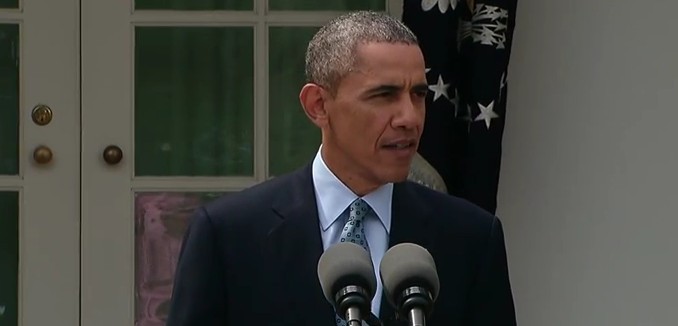The P5+1 nations and Iran concluded an understanding to limit elements of Iran’s nuclear research and lift international sanctions on Iran today in Lausanne, Switzerland. Even as he praised the agreed-upon parameters, President Barack Obama raised doubts about Iran’s record of abiding by past international commitments.
The New York Times reports on some the key provisions of the deal:
According to European officials, roughly 5,000 centrifuges will remain spinning enriched uranium at the main nuclear site at Natanz, about half the number currently running. The giant underground enrichment site at Fordo – which Israeli and some American officials fear is impervious to bombing – will be partly converted to advanced nuclear research and the production of medical isotopes. Foreign scientist will be present. There will be no fissile material present that could be used to make a bomb.
A major reactor at Arak, which officials feared could produce plutonium, would operate on a limited basis that would not provide enough fuel for a bomb.
In return the European Union and the United States would begin to lift sanctions, as Iran complied. At a news conference following the announcement, Mr. Zarif said that essentially all sanctions would be lifted after the final agreement if signed.
The terms of the understanding, called the Joint Comprehensive Plan of Action (JCPOA), are posted here (.pdf).
The European Union and Iran issued a joint statement announcing the deal:
Fordow will be converted from an enrichment site into a nuclear, physics and technology centre. International collaboration will be encouraged in agreed areas of research. There will not be any fissile material at Fordow. An international joint venture will assist Iran in redesigning and rebuilding a modernized Heavy Water Research Reactor in Arak that will not produce weapons grade plutonium. There will be no reprocessing and the spent fuel will be exported. A set of measures have been agreed to monitor the provisions of the JCPOA including implementation of the modified Code 3.1 and provisional application of the Additional Protocol. The International Atomic Energy Agency (IAEA) will be permitted the use of modern technologies and will have enhanced access through agreed procedures, including to clarify past and present issues. Iran will take part in international cooperation in the field of civilian nuclear energy which can include supply of power and research reactors. Another important area of cooperation will be in the field of nuclear safety and security. The EU will terminate the implementation of all nuclear-related economic and financial sanctions and the US will cease the application of all nuclear-related secondary economic and financial sanctions, simultaneously with the IAEA-verified implementation by Iran of its key nuclear commitments.
In an address today, Obama hailed the understanding reached as a “good deal,” and talked about the promise that it held for Iran.
To the Iranian people, I want to reaffirm what I’ve said since the beginning of my presidency. We are willing to engage you on the basis of mutual interests and mutual respect.
This deal offers the prospect of relief from sanctions that were imposed because of Iran’s violation of international law. Since Iran’s supreme leader has issued a fatwa against the development of nuclear weapons, this framework gives Iran the opportunity to verify that it’s program is, in fact, peaceful. It demonstrates that if Iran complies with its international obligations, then it can fully rejoin the community of nations, thereby fulfilling the extraordinary talent and aspirations of the Iranian people. That would be good for Iran, and it would be good for the world.
The success of the deal is premised on the belief that Iran will abide by previous international obligations, but as the president noted, the current conflict over Tehran’s nuclear program stemmed from Iran’s continuing violations of its past commitments. For example, Iran is committing now to implement the International Atomic Energy Agency’s additional protocol, something it agreed to do a decade ago but, despite briefly abiding by it, never ratified.
To date, Iran has prevented international inspectors from visiting areas of the Parchin military base where it is believed to have carried out nuclear detonation experiments. Iran has also failed to address issues of its past nuclear research as it was required to do by the Joint Plan of Action (JPOA) that it signed in November 2013. Moreover, Iran fed uranium into an advanced centrifuge in violation of the JPOA and only stopped when the violation was detected; it was not penalized for this violation.
[Photo: The White House / YouTube ]




